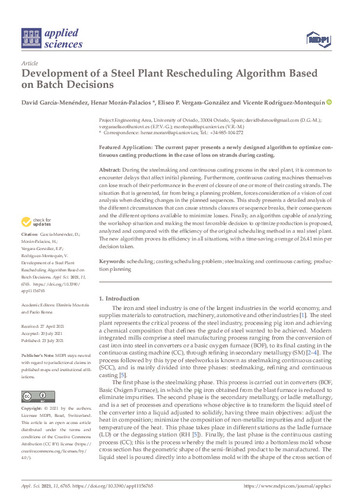Development of a Steel Plant Rescheduling Algorithm Based on Batch Decisions
Fecha de publicación:
Versión del editor:
Citación:
Resumen:
During the steelmaking and continuous casting process in the steel plant, it is common to encounter delays that affect initial planning. Furthermore, continuous casting machines themselves can lose much of their performance in the event of closure of one or more of their casting strands. The situation that is generated, far from being a planning problem, forces consideration of a vision of cost analysis when deciding changes in the planned sequences. This study presents a detailed analysis of the different circumstances that can cause strands closures or sequence breaks, their consequences and the different options available to minimize losses. Finally, an algorithm capable of analyzing the workshop situation and making the most favorable decision to optimize production is proposed, analyzed and compared with the efficiency of the original scheduling method in a real steel plant. The new algorithm proves its efficiency in all situations, with a time-saving average of 26.41 min per decision taken
During the steelmaking and continuous casting process in the steel plant, it is common to encounter delays that affect initial planning. Furthermore, continuous casting machines themselves can lose much of their performance in the event of closure of one or more of their casting strands. The situation that is generated, far from being a planning problem, forces consideration of a vision of cost analysis when deciding changes in the planned sequences. This study presents a detailed analysis of the different circumstances that can cause strands closures or sequence breaks, their consequences and the different options available to minimize losses. Finally, an algorithm capable of analyzing the workshop situation and making the most favorable decision to optimize production is proposed, analyzed and compared with the efficiency of the original scheduling method in a real steel plant. The new algorithm proves its efficiency in all situations, with a time-saving average of 26.41 min per decision taken
ISSN:
DOI:
Ficheros en el ítem





